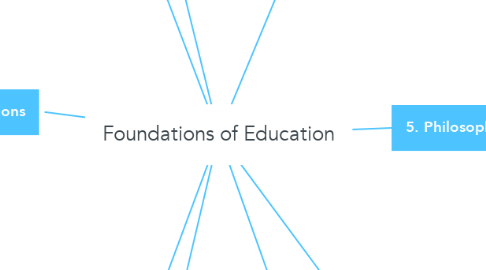
1. 2. Politics of Education
1.1. Purposes of Education
1.1.1. Intellectual Purposes
1.1.2. Political Purposes
1.1.3. Social Purposes
1.1.4. Economic Purposes
1.2. Perspectives
1.2.1. Liberal Role of School
1.2.1.1. To defend those that are disadvantaged economically and politically.
1.2.2. Radical Explanations of unequal education performance
1.2.2.1. Believe a socialist economy from the democratic system would be more prompt to provide all students with a good standard of living.
1.2.3. Conservative Definition of Educational Problems
1.2.3.1. Personal Responsibility
2. 3. History of Education
2.1. Most Influential Reform
2.1.1. Education for All: The Emergence of the Public High School
2.1.1.1. During this reform, it allowed for an expansion in in high school education. This allowed for the NEA to be established to make purpose for secondary education.
2.2. Historical Interpretation
2.2.1. Equality of Opportunity
2.2.1.1. "great equalizer"
3. 4. The Sociology of Education
3.1. Theoretical Prospectives
3.1.1. 1. Functional Theory support structures, programs, and curricula and encourages social unity.
3.1.2. 2. Conflict Theories believe in the ability of dominance on groups to impose the will on subordinate groups through force, cooperation, and manipulation.
3.1.3. 3. Interaction Theories are critiques and extensions of there functional and conflict perspectives.
3.2. Five different effects of schooling on Individuals
3.2.1. Employment is based on the more education a person has then the more hirable they may be.
3.2.2. Teacher Behavior , when you set higher expectations for your students then they want to achieve bigger and better things.
3.2.3. Mobility is when a educator is more educated and allowed more mobility for changes in social status
3.2.4. Knowledge and Attitudes - When a person has more education this correlates to the persons political and public affairs.
4. 5. Philosophy of Education
4.1. Pragmatism
4.1.1. Peoples who are action oriented and experientially grounded.
4.1.1.1. Generic Notions
4.1.1.1.1. Instrumentalism and experimentalism
4.1.1.2. Goal of Education
4.1.1.2.1. Believed that school should provide "conjoint, communicative experience"
4.1.1.3. Researchers: Sanders Peirce, William James, and John Dewey
4.1.1.4. Role of a Teacher
4.1.1.4.1. The Teacher is no longer the disciplinarian
4.1.1.5. Method of Instruction
4.1.1.5.1. Problem Solving or Inquiry method
4.1.1.6. Curriculum
4.1.1.6.1. This is a particular subject being studies by the students. Progressive educators like to start with the contemporary problems and going from the known to the unknown.
5. 6. Schools as Organizations
5.1. House of Representatives
5.1.1. Speaker of the House District 25 Mac McCutcheon
5.1.2. Speaker Pro Tempor House District 100 Victor Gaston
5.1.3. Clerk of the House Jeffery Woodard
5.2. Alabama State Senator
5.2.1. Richard Shelby
5.3. Alabama Sate Superintendant
5.3.1. Michael Sentance
5.4. Dekalb County Superintendant
5.4.1. Jason Barnett
5.5. Dekalb County Board Members
5.5.1. Board Chair. Dr. Melvin Johnson
5.5.2. Vice Chair. Dr. Michael A. Erwin
5.5.3. Mr. Stan O. Jester
5.5.4. Mr. James L. McMahan
5.5.5. Dr. Joyce Morley
5.5.6. Mr. Marshall D. Orson
5.5.7. Mrs. Vickie D. Turner
5.6. School Processes
5.7. School Culture
5.7.1. Schools are made up of many cultures and also personalities. Willard Waller said, "The school is a social organism". Meaning all kids are different and function in different ways but as a whole, they make up the school its self. They are what makes the organism.
6. 7. Curriculum and Pedagogy
6.1. Curriculums I Advocate
6.1.1. I emphasize with both these two curriculums in different ways. I believe that all students deserve the same education. I know some children need more help than others but I also know that when you don't expect as much from certain students then you won't receive as much as well. With developmentalist they also believe in putting students first, as do I.
6.1.1.1. Humanist Curriculum
6.1.1.1.1. A more traditional curriculum that is presented to students the best of knowledge that has been taught and written.
6.1.1.2. Developmentalist Curriculum
6.1.1.2.1. Focuses on the needs of the students more so than the needs of the society.
7. 8. Equality of Opportunity
7.1. Impact on Educational Outcomes
7.1.1. Race
7.1.1.1. This can be HUGE factor in how much education this person can likely receive.
7.1.2. Gender
7.1.2.1. This is a factor in the students educational attainment.
7.1.3. Class
7.1.3.1. This can effect students educational experiences.
7.2. Coleman Study Responses (1982)
7.2.1. The study on educational progress between public school systems and private school systems.
8. 9. Educational Inequality
8.1. Cultural Differences Theory
8.1.1. Believe that African Americans do not do as well in schools because they adapt to the oppressed position in class structure.
8.1.2. Also, believe that working-class students adapt to the unequal aspects of class structure.
8.2. School-Centered Explanations for Educational Inequality
8.2.1. School Financing
8.2.2. Effective School Research
8.2.3. Between-School Differences
8.2.4. Within-School Differences
8.2.5. Gender and Schooling
9. 10. Educational Reform
9.1. School Based Reforms
9.1.1. School Choice
9.1.2. Charter Schools
9.1.3. Tuition Vouchers
9.2. Types of Reforms
9.2.1. Societal
9.2.2. Economical
9.2.3. Community
9.2.4. Political
